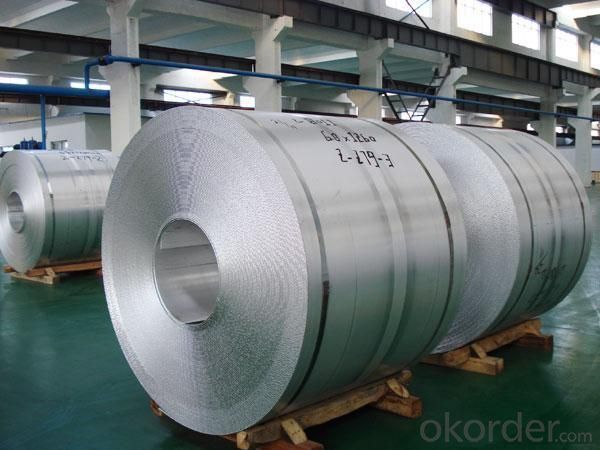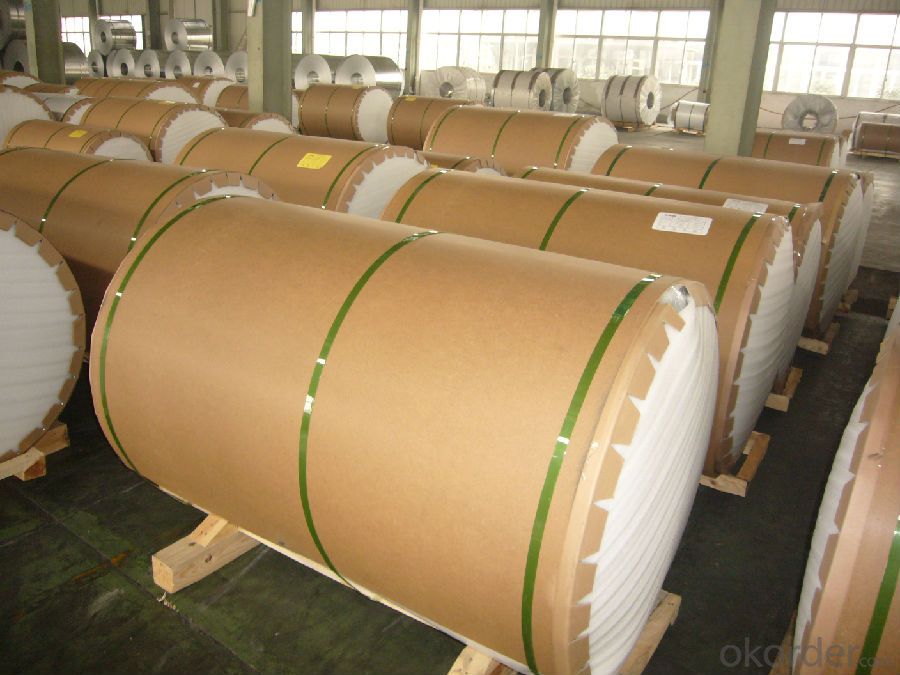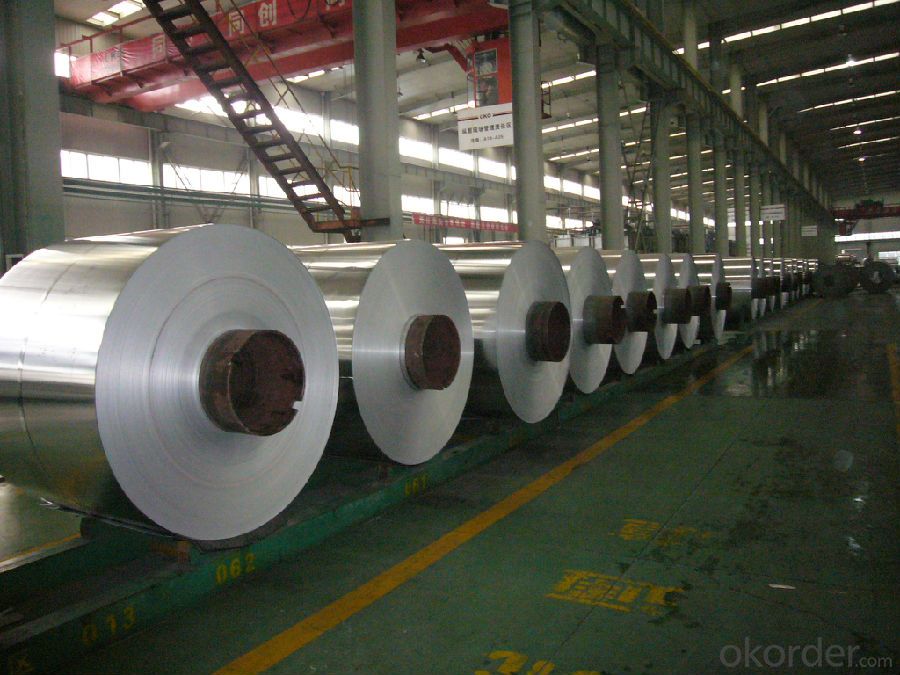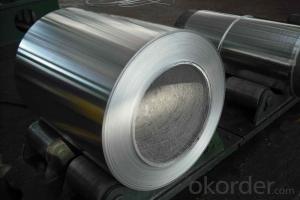C.C AA1070 Aluminum Coils used as BUiding Material
- Loading Port:
- Shanghai
- Payment Terms:
- TT OR LC
- Min Order Qty:
- 3 m.t.
- Supply Capability:
- 10000 m.t./month
OKorder Service Pledge
OKorder Financial Service
You Might Also Like
Item specifice
1.Structure of C.C AA1070 Aluminum Coils used as BUiding Material Description
C.C AA1070 Aluminum Coils used as BUiding Material widly used in decoration field. For the painting, it depends on the using evironment. If you use in the open air, we recommend the PVDF coated aluminium coils. This kind of painting can last 15-20 years. If you use in the room, we recommend PE coated aluminium coils. The price is much more competitive.
Direct Continuous Aluminium Foil Stock in Coil is one semi-finished aluminium material. This strip can be rolled down to aluminium foil.The final thickess can be 5-20 microns. Aluminium foil is soft, ductile and with a silver-white luster which can be widely used in a large scare of fields.
2.Main Features of C.C AA1070 Aluminum Coils used as BUiding Material
a.Competitive price---We have our own mills and can produce mill finished aluminium coils, so we can control the production cost better.
b.Professional after-sale service---We have more than 15 years exportation experience and you need not worry about the exporation problems.
c.Fast delivery time---We can control the delivery time within 35 days.
3.C.C AA1070 Aluminum Coils used as BUiding Material Images



4.C.C AA1070 Aluminum Coils used as BUiding Material Specification
Alloy | AA1070 |
Temper | H14, H16, H18, H22, H24, H26, H32, O/F |
Thickness | 0.2mm -- 100mm |
Width | 30mm -- 1700mm |
Standard | GB/T 3880-2006,EN |
5. FAQ of C.C AA1070 Aluminum Coils used as BUiding Material
A.How to guarantee the quality?
Customers are welcome to our mill to visit and check the products. Besides, we can arrange a third party to test C.C AA1070 Aluminum Coils used as BUiding Material.
B.When will you deliver the products?
C.C AA1070 Aluminum Coils used as BUiding Material will be delivered within 35 days after receiving advanced payment or original L/C.
- Q:Aluminum extrusions are bars made with hollow cavities that allow each to be joined easily, using special connectors. The primary difficulty when painting aluminum extrusions centers on the fact that they are nonporous and durable. Each of these traits creates a complication of its own.
- Your question supposes that you need to Paint the Aluminum Extrusion. The more common thing to do is to Anodize the extrusion. This process coats all surfaces with a hard durable coating. There are several colors available. Actually It's common to use Urethane's to paint Aluminum and the primer isn't simply made for metal, but is specifically for Aluminum. A lot of Airplanes are coated every day in this manner. Methods for coating the insides of tubing have been used for a very long time. You basically fill the tube with primer or coating then drain the excess out (dip method) and difficult shapes can be powder coated or electro static coated. Extrusions can be roller coated after cleaning, vinyls work very well with out priming. Think Toothpaste tubes.
- Q:Can aluminum coils be used for roofing applications?
- Yes, aluminum coils can be used for roofing applications. Aluminum is a popular choice for roofing materials due to its numerous advantages. It is lightweight, which makes it easier to transport and install. Aluminum is also highly durable and resistant to corrosion, which ensures a longer lifespan for the roof. Additionally, aluminum is a great choice for areas with high humidity or coastal regions, as it does not rust. Moreover, aluminum roofing is energy efficient, as it reflects sunlight and heat, reducing cooling costs. Overall, aluminum coils are an excellent option for roofing applications due to their strength, durability, and energy efficiency.
- Q:What are the potential applications of coil-perforated aluminum coils?
- Coil-perforated aluminum coils have a wide range of potential applications due to their unique properties. They can be used in architectural and construction projects for decorative facades, sunscreens, and acoustic panels. Additionally, they find use in automotive manufacturing for radiator grilles and soundproofing components. The coils are also suitable for air filtration systems, HVAC equipment, and industrial machinery, thanks to their excellent airflow and heat dissipation capabilities. Overall, the potential applications of coil-perforated aluminum coils are extensive, offering versatility and functionality in various industries.
- Q:Are there any limitations to the maximum coil diameter of aluminum coils?
- Yes, there are limitations to the maximum coil diameter of aluminum coils. The maximum diameter is typically determined by various factors such as the size and capacity of the manufacturing equipment, transportation restrictions, and the practical limitations of handling larger coils.
- Q:How are aluminum coils used in the production of battery enclosures?
- Aluminum coils are used in the production of battery enclosures as they provide a lightweight and durable material that can be easily molded and shaped to form the enclosure. The coils are typically processed and formed into specific shapes using a combination of heating, rolling, and cutting techniques. This allows for the creation of seamless and tightly sealed enclosures that can protect the batteries from external elements and provide efficient heat dissipation.
- Q:Can aluminum coils be used in the production of aluminum composite ceilings?
- Yes, aluminum coils can be used in the production of aluminum composite ceilings. Aluminum coils are often used as the base material for manufacturing aluminum composite panels, which are then used to create ceilings. These coils are typically made of high-quality aluminum alloy and have undergone various processes to ensure their strength, durability, and aesthetic appearance. The aluminum coils are coated with a protective layer, such as PVDF or polyester, to enhance their resistance to weathering, UV rays, and corrosion. This coating also allows for a wide range of color options, providing flexibility in design choices for aluminum composite ceilings. Overall, aluminum coils are an essential component in the production of aluminum composite ceilings, offering a lightweight, fire-resistant, and long-lasting solution for various architectural and interior design applications.
- Q:Can aluminum coils be used for automotive body panels?
- Certainly, automotive body panels can be made using aluminum coils. In fact, aluminum is gaining popularity in the automotive sector due to its numerous advantages. Its lightweight nature contributes to enhanced fuel efficiency and overall vehicle performance. Furthermore, aluminum exhibits exceptional resistance to corrosion, making it a durable option for automotive body panels. Additionally, aluminum can be easily shaped and molded, enabling intricate designs and improved aerodynamics. All in all, utilizing aluminum coils for automotive body panels presents a viable choice with a multitude of benefits.
- Q:How do aluminum coils contribute to sustainable manufacturing?
- There are several ways in which aluminum coils significantly contribute to sustainable manufacturing. To begin with, aluminum is a highly recyclable material, and the use of aluminum coils helps establish a closed-loop recycling system. These coils can be easily melted and reused without losing their original properties, reducing the need for new raw materials and minimizing the environmental impact of mining and extraction. Moreover, the lightweight nature of aluminum coils plays a crucial role in reducing energy consumption during transportation. This lightness makes them more fuel-efficient to transport, resulting in lower greenhouse gas emissions. Consequently, this not only reduces the carbon footprint but also saves costs associated with transportation. Furthermore, aluminum possesses excellent corrosion resistance properties, rendering it durable and long-lasting. This durability reduces the frequency of replacements, leading to less waste generation. Additionally, it extends the lifespan of products utilizing aluminum coils, ultimately reducing overall resource consumption and lessening environmental strain. Additionally, the utilization of aluminum coils in manufacturing processes promotes energy efficiency. Aluminum's high thermal conductivity allows for efficient heat transfer and dissipation during various manufacturing operations, resulting in reduced energy consumption. This energy efficiency leads to lower energy costs and diminished greenhouse gas emissions. Lastly, aluminum is non-toxic and does not release harmful substances throughout its lifecycle. This ensures the safety of workers, consumers, and the environment. The absence of toxic materials also simplifies the recycling process, making it easier and more environmentally friendly. In conclusion, aluminum coils contribute to sustainable manufacturing through their recyclability, lightweight nature, durability, energy efficiency, and non-toxic properties. By incorporating aluminum coils into manufacturing processes, companies can reduce their environmental impact, conserve resources, and promote a more sustainable future.
- Q:Are aluminum coils suitable for weather-resistant applications?
- Indeed, weather-resistant applications are well-suited for aluminum coils. Renowned for its exceptional corrosion resistance, aluminum remains a favored option for outdoor and weather-exposed uses. When in contact with air, the metal develops a safeguarding oxide layer on its surface, effectively shielding it from moisture, humidity, and other weather elements. This oxide layer plays a vital role in averting rust or degradation over time. Moreover, thanks to its lightweight nature and impressive strength-to-weight ratio, aluminum proves to be a pragmatic selection for an array of weather-resistant applications including roofing, gutters, siding, and outdoor signage.
- Q:Are aluminum coils suitable for fire-resistant applications?
- No, aluminum coils are not suitable for fire-resistant applications. Aluminum has a low melting point and is highly flammable, making it a poor choice for fire-resistant applications. In fact, aluminum can even contribute to the spread of fire due to its combustible nature. For fire-resistant applications, materials such as steel or fire-resistant alloys are recommended as they have a higher melting point and better resistance to fire. These materials are designed to withstand high temperatures and are less likely to contribute to the spread of fire.
1. Manufacturer Overview |
|
|---|---|
| Location | |
| Year Established | |
| Annual Output Value | |
| Main Markets | |
| Company Certifications | |
2. Manufacturer Certificates |
|
|---|---|
| a) Certification Name | |
| Range | |
| Reference | |
| Validity Period | |
3. Manufacturer Capability |
|
|---|---|
| a)Trade Capacity | |
| Nearest Port | |
| Export Percentage | |
| No.of Employees in Trade Department | |
| Language Spoken: | |
| b)Factory Information | |
| Factory Size: | |
| No. of Production Lines | |
| Contract Manufacturing | |
| Product Price Range | |
Send your message to us
C.C AA1070 Aluminum Coils used as BUiding Material
- Loading Port:
- Shanghai
- Payment Terms:
- TT OR LC
- Min Order Qty:
- 3 m.t.
- Supply Capability:
- 10000 m.t./month
OKorder Service Pledge
OKorder Financial Service
Similar products
New products
Hot products
Related keywords





























